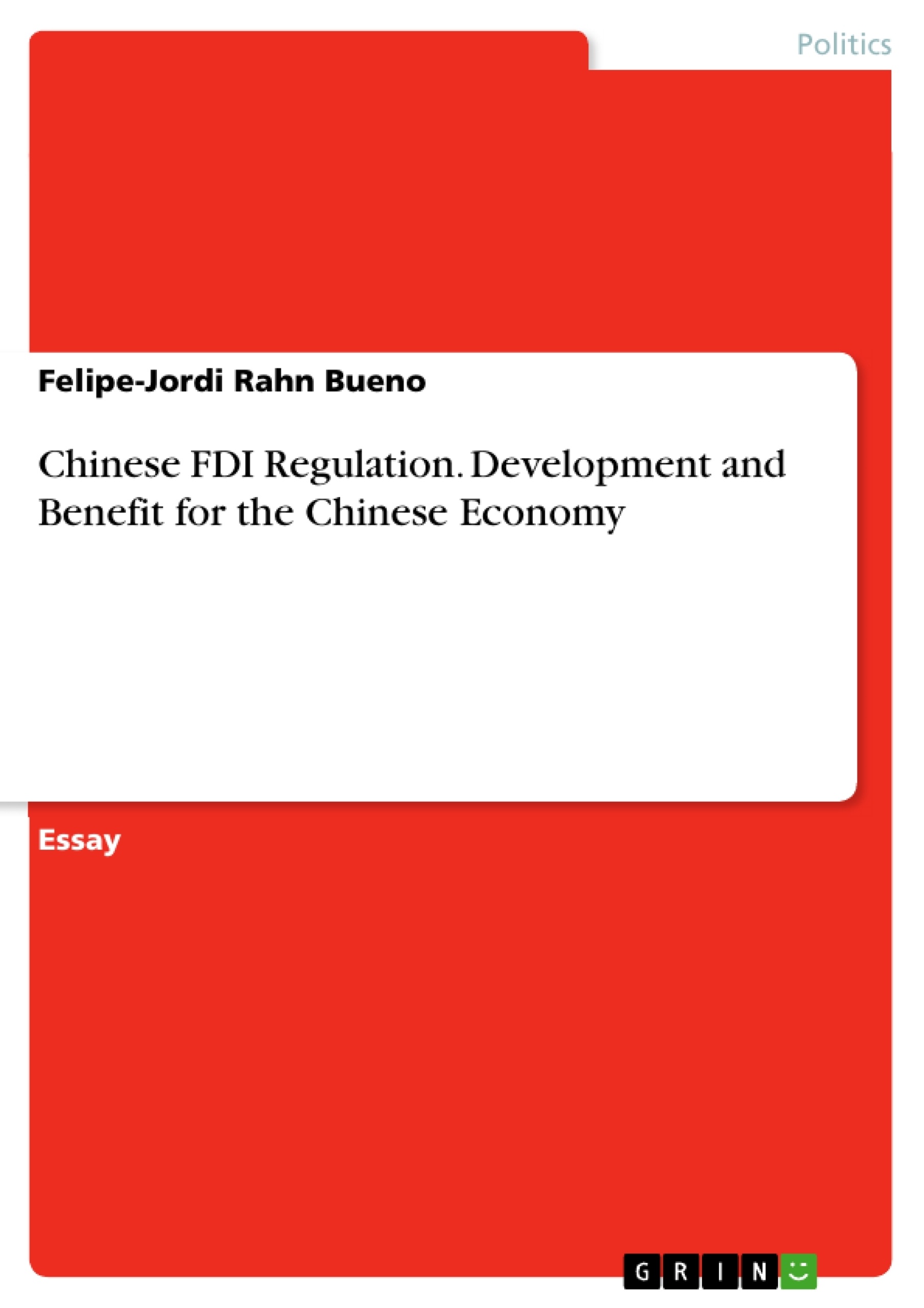My paper will address the development of the Chinese economy and in which way the regulation of foreign direct investment (FDI) helped China to overcome a financial trough and to swing themselves up to one of the biggest players on the global market. Therefore, my guiding question will be "How has the Chinese regulation of FDI from the late 1970s until the 2000s boosted the economy of the country?".
My topic and research question are relevant because the economic evolution China has been through is unique, even though its growth model was like those of other Asian or Communist countries and other states like the UDSSR failed to transition their market into a more liberal system. The astonishing success story that China has written was greatly influenced by the opening to FDI whilst still having restrictions on it to channel it into the right sectors for developing the country.
This essay is based on the neoclassical growth theory which seems to fit the most since the three driving factors of this theory are labour, capital and technology, which are all important factors of China's economic growth. To explain its case, I will mainly use academic literature from researchers specialized on Chinese economy, a scientific article and a study. I will use data from the Worldbank and from various surveys that Long evaluated to point out and underline the growth of China's economy.
I found that FDI clearly helped to spur the rise of the Chinese economy, even though the study of Ford did not find direct benefits of FDI in China in the long run but admits positive indirect effects. My findings in this paper are therefore that the applied regulative measures were effective at the time but might not be sustainable if they wanted to use this set of regulations in the future.
Inhaltsverzeichnis (Table of Contents)
- Introduction
- China's Problematic Situation
- The Liberalization Process
- Export Processing Contracts
- Opening the Door to Foreign Business
- Taxation System and Exemptions
- Special Economic Zones Attract Foreign Business
Zielsetzung und Themenschwerpunkte (Objectives and Key Themes)
This paper examines the evolution of the Chinese economy and the role of Foreign Direct Investment (FDI) regulation in its growth trajectory. It aims to answer the question of how China's FDI regulation, from the late 1970s to the 2000s, contributed to the country's economic rise. The paper utilizes a neoclassical growth theory framework to analyze the impact of FDI on the Chinese economy, drawing upon academic literature and data from the World Bank and other sources.
- The evolution of China's economic policy from a centrally planned system to a more open market.
- The impact of FDI regulation on the Chinese economy, particularly its role in promoting exports and technological development.
- The effectiveness of various regulatory measures implemented by the Chinese government, including tariffs, non-tariff barriers, and tax incentives.
- The contribution of Special Economic Zones (SEZs) to attracting foreign investment and driving economic growth.
- The role of FDI in facilitating skill development and training within China.
Zusammenfassung der Kapitel (Chapter Summaries)
The paper begins by outlining the challenging economic situation China faced in the late 1970s, characterized by a low GDP and limited access to advanced technologies. This situation was driven by the country's restrictive trade policies and overvalued currency, hindering its ability to import essential inputs and technologies.
The paper then explores the gradual liberalization process undertaken by the Chinese government, highlighting the critical role of export-processing contracts. These contracts allowed foreign companies to utilize Chinese labor for manufacturing exports, providing access to foreign currency without significantly impacting the domestic market.
The paper further examines the introduction of the law on joint ventures, which marked the opening of the Chinese market to foreign investors. It delves into the strategic implementation of tariffs, non-tariff barriers, and tax incentives to protect the domestic market while attracting targeted foreign investment.
The paper concludes by discussing the establishment of Special Economic Zones (SEZs) and their role in attracting foreign investment and driving economic growth. It explores the advantages of SEZs in terms of location, administrative efficiency, and incentives offered to foreign businesses. The paper also highlights the positive impact of FDI on workforce training and development within China.
Schlüsselwörter (Keywords)
The key terms and concepts explored in this paper include foreign direct investment (FDI), Chinese economic growth, FDI regulation, special economic zones (SEZs), export processing contracts, tariffs, non-tariff barriers, tax incentives, technological development, and workforce training.
Frequently Asked Questions
How did FDI regulation contribute to China's economic rise?
China used FDI regulation to channel foreign capital into specific sectors, promote technological development, and boost exports while protecting domestic industries.
What are Special Economic Zones (SEZs) in China?
SEZs are designated areas with more liberal economic laws than the rest of the country, designed to attract foreign investment through tax incentives and efficient administration.
What role did export processing contracts play?
These contracts allowed foreign firms to use Chinese labor for manufacturing exports, providing China with foreign currency and industrial experience without fully opening domestic markets.
Is the Chinese FDI model sustainable for the future?
Research suggests that while these regulative measures were effective during the transition phase, they might not be sustainable for a fully developed, mature economy.
How did FDI affect the Chinese workforce?
FDI facilitated skill development and training, as foreign companies brought in advanced technologies and management practices that were adopted by local employees.
- Quote paper
- Felipe-Jordi Rahn Bueno (Author), 2018, Chinese FDI Regulation. Development and Benefit for the Chinese Economy, Munich, GRIN Verlag, https://www.grin.com/document/497719



